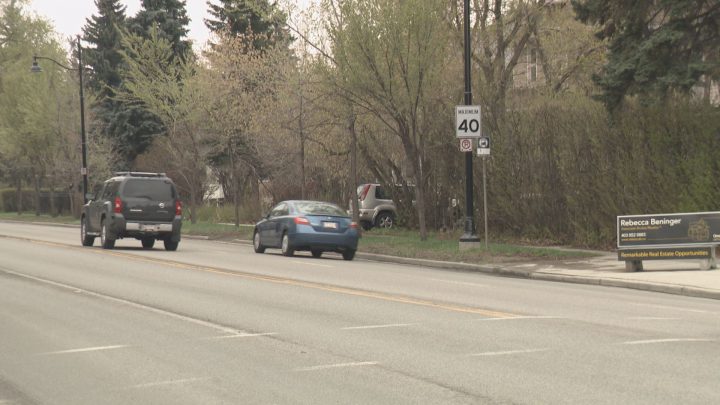Reducing Calgary’s residential speed limits could go to a city-wide vote at the upcoming general election in October 2021.

Council members voted 8-6 in favour of Coun. Peter Demong’s referral on Tuesday, which proposed putting the decision to a public vote following a February council meeting. Councillors Farrell, Gondek, Keating, Carra, Woolley and Mayor Naheed Nenshi were opposed.
Nenshi said the council will “examine the option of a plebiscite,” adding he’s curious to see the question that the administration comes forward with, which could include whether citizens want to go further than the original recommendations to include boulevards and drives in neighbourhood speed reductions.

“I generally have an antipathy towards plebiscites,” Nenshi said Tuesday. “I figure people elected us to do a job and people are busy right now.
“And quite frankly, we have spent a ton of time delving very deeply into a lot of scientific data, into a lot of different pieces of work that have led here.”
The city’s transportation and transit committee recommended collector roads have a 50km/h speed limit and residential roads have an unposted speed limit of 40km/h, after hearing from members of the public on Sep. 30. Council heard more public submissions on the evening of Nov. 2 and the morning of Nov. 3.
Demong said council has a “unique opportunity to hear from Calgarians” with the municipal election set for Oct. 18, 2021.
“What I’m asking for isn’t necessarily a straight up or down vote on whether we should be calling a vote of the electors, commonly referred to as a plebiscite,” the Ward 14 representative said.
“But what I am recommending is that we return to the February strategic meeting of council to discuss this concept and other potential questions for a vote of the electors in the 2021 municipal election.”

One Calgary political science professor called the idea “ridiculous,” saying council is elected to make decisions on matters like residential speed limits.
“Plebiscites are a useful tool in very rare and exceptional circumstances,” MRU professor Duane Bratt told Global News. “An Olympic bid, for example, which was mandated by the province as well before their funds would go through.
“But determining speed limits? You might as well have a plebiscite on whether there should be a stop sign at the end of my block. That’s why we elect people to deal with these issues.”
Bratt said the last municipal plebiscite he remembered was about video lottery terminals (VLTs) in bars, saying councils at the time were dealing with the new gambling technology.
According to a University of Calgary study, plebiscites over VLTs were held in 36 municipalities during the 1998 civic elections.
The current neighbourhood speed limits review dates back to 2016 when the city’s pedestrian strategy was approved with the commitment to make the city “safer, more comfortable and interesting for walking” and a September 2018 notice of motion to get the speed limit reductions underway.
But city councils dating back to 1982 have been looking at complaints about vehicles speeding through residential neighbourhoods.
Bratt said this could add to an already lengthy ballot. On July 23, Bill 26 — the Constitutional Referendum Act — was passed by the Alberta government. The province has also announced referenda on equalization, Senate elections and a provincial pension plan to be added to upcoming municipal elections.
“I have a problem with those as well,” Bratt said. “Not because they’re not big issues and they are big issues, but they’re not municipal issues. And so they’re crowding municipal politics with provincial or even national policy area.”
The MRU professor said voters who aren’t well-studied on the issues could vote out of ignorance.
“It’ll either be a gut reaction or just a guess.”
Bratt said plebiscites also strip any nuance from the conversation of complicated issues.
“There are no other options. It becomes very cut and dry,” he said. “And these issues are not cut and dry.”








Comments